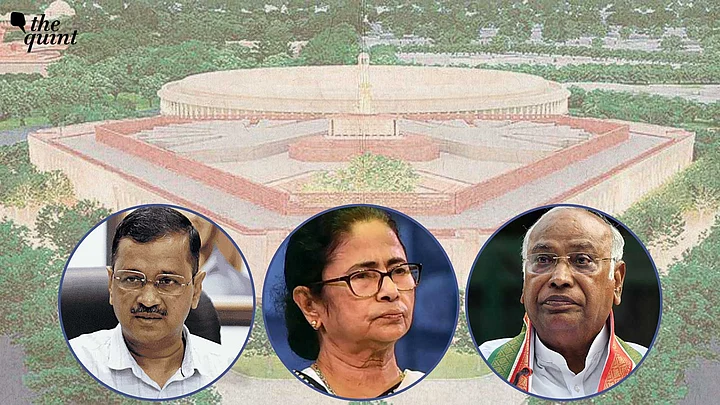As many as 19 Opposition parties have boycotted the inauguration of the new Parliament building by Prime Minister Narendra Modi on Sunday, 28 May.
Which are the parties?
What reasons are they citing for their boycott?
Is this the right call or is it a mistake?
Why is this decision important?
This piece will try and answer these four questions.
Which Are the 19 Parties Boycotting the Inauguration?
The parties that have signed the joint statement are – Congress, DMK, Aam Aadmi Party, Shiv Sena (UBT), Samajwadi Party, CPI, CPI-M, JMM, Kerala Congress-Mani, Viduthalai Chiruthegal Katchi, Rashtriya Lok Dal, Trinamool Congress, Janata Dal (United), NCP, RJD, IUML, National Conference, Revolutionary Socialist Party, and Marumalarchi Dravida Munnetra Kazhagam.
What's Their Rationale?
In their joint statement, the Opposition parties said:
“Prime Minister Modi’s decision to inaugurate the new Parliament building by himself, completely sidelining President Murmu, is not only a grave insult but a direct assault on our democracy which demands a commensurate response.”
“When the soul of democracy has been sucked out from the Parliament, we find no value in a new building. We announce our collective decision to boycott the inauguration of the new Parliament building.”
Here's the full statement.
Is This the Right Call?
Now, this is subjective.
Let us concede that the Opposition's allegations may have some merit. From the manner in which the farm laws were passed to the recent ordinance issued by the Centre curtailing the powers of the elected government of Delhi, there are several decisions by the Centre which can be seen as going contrary to the democratic traditions.
The Opposition parties may also have a point when they say that the President should have inaugurated the new Parliament.
However, does this merit a boycott of the inauguration ceremony itself?
The Parliament belongs to the entire nation. Yes, PM Modi may be inaugurating it and probably this isn't how the inauguration should have happened. But the building itself and the institution it represents, will remain much after PM Modi's term. At least that's what one hopes.
Who knows, maybe one day some of these 19 parties will be in the treasury benches of the new Parliament building and one of their members may be the prime minister. There are some occasions which need to be seen from the perspective of the long-term history of institutions and not from the partisan rivalries of the present day.
If tomorrow, the PM uses the 26 January parade to push his own personal brand, will the Opposition boycott the Republic Day parade?
This doesn't mean that the Opposition gives the government a free pass. There are a number of things they could have done between a complete acceptance and complete boycott – wearing black bands or sending only token representatives, for instance.
Three Reasons Why This Is Important?
1. Between them, the parties boycotting the ceremony have about 140 Lok Sabha seats and around 97 Rajya Sabha seats. This means that about one in every four Lok Sabha MPs and two in every five Rajya Sabha MPs won't be present at the inauguration.
Whether justified or not, this is a huge political statement from the Opposition.
2. The second reason why this is important is that it gives us a clear indication of the parties that are firmly in the anti-BJP camp in the run-up to 2024 general elections.
This can be seen as an important first step for possible future collaboration between these parties.
Had even one UPA constituent or known anti-BJP parties like AAP, SP, JD-U or TMC broken ranks, it would have given the media a chance to allege chinks in the Opposition ranks.
3. The third reason actually stems from Prime Minister Narendra Modi. At different points of time in the past, Opposition parties have chosen not to take a particular stand out of fear that PM Modi and the BJP will use it as an argument against them and label them as 'anti-national'. Few can deny that the political hegemony of the PM and the BJP has become such that parties often do fear the consequences of taking a clear stand on certain issues.
In the case of the current boycott, the leaders of these 19 parties would definitely be aware that PM Modi and the BJP will accuse them of not participating in an event of 'national importance'. It is important that these parties have decided not to go on the backfoot for fear of being targeted by the BJP. Whether this issue was worth such a boycott will remain contested. But the battle lines for 2024 have been drawn.
